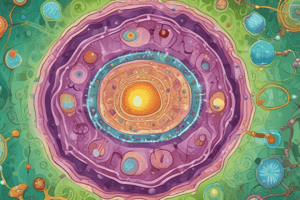Podcast
Questions and Answers
What is the primary function of the plasma membrane?
What is the primary function of the plasma membrane?
- Regulate the movement of substances in and out of the cell (correct)
- Protein synthesis
- Energy generation
- Waste management
What is the location of ribosome synthesis?
What is the location of ribosome synthesis?
- Lysosomes
- Mitochondria
- Nucleolus (correct)
- Nucleus
What is the resolution of a light microscope?
What is the resolution of a light microscope?
- 1-10 μm
- 10-100 nm
- 0.2-0.3 μm (correct)
- 1-10 nm
What is the function of lysosomes?
What is the function of lysosomes?
What is the function of the endoplasmic reticulum?
What is the function of the endoplasmic reticulum?
Who is credited with formulating the cell theory?
Who is credited with formulating the cell theory?
What is the location of DNA in the cell?
What is the location of DNA in the cell?
What type of microscope produces a three-dimensional image of the cell surface?
What type of microscope produces a three-dimensional image of the cell surface?
What is the main function of the Golgi apparatus?
What is the main function of the Golgi apparatus?
Who is credited with the discovery of microorganisms using a microscope?
Who is credited with the discovery of microorganisms using a microscope?
Flashcards are hidden until you start studying
Study Notes
Cell Organelles
- Plasma Membrane:
- Also known as the cell membrane or cytoplasmic membrane
- Semi-permeable membrane that separates the cell from its environment
- Regulates the movement of substances in and out of the cell
- Composed of a phospholipid bilayer with embedded proteins
- Nucleus:
- Control center of the cell where DNA is stored
- Surrounded by a double membrane called the nuclear envelope
- Contains nucleolus, where ribosome synthesis occurs
- Other Organelles:
- Mitochondria: generates energy for the cell through cellular respiration
- Endoplasmic Reticulum (ER): involved in protein synthesis, transport, and storage
- Ribosomes: site of protein synthesis
- Lysosomes: contains digestive enzymes for breaking down and recycling cellular waste
- Golgi Apparatus: involved in protein modification, sorting, and secretion
Structures of Microscope
- Light Microscope:
- Uses visible light to produce an image
- Limited resolution (0.2-0.3 μm)
- Electron Microscope:
- Uses a beam of electrons to produce an image
- Higher resolution (1-10 nm) than light microscope
- Scanning Electron Microscope:
- Produces a three-dimensional image of the cell surface
- Higher resolution than light microscope
Discoveries about Cells
- Antonie van Leeuwenhoek (1676): first observed microorganisms using a microscope
- Matthias Jakob Schleiden and Theodor Schwann (1839): formulated the cell theory, which states that:
- All living organisms are composed of cells
- Cells are the basic units of life
- All cells arise from pre-existing cells
Basic Functions of Cells
- Metabolism: cells carry out chemical reactions to maintain homeostasis and energy production
- Growth and Development: cells divide, grow, and differentiate to form tissues and organs
- Response to Stimuli: cells respond to changes in their environment through signal transduction pathways
- Reproduction: cells divide to produce new cells, ensuring the continuation of life
Studying That Suits You
Use AI to generate personalized quizzes and flashcards to suit your learning preferences.




